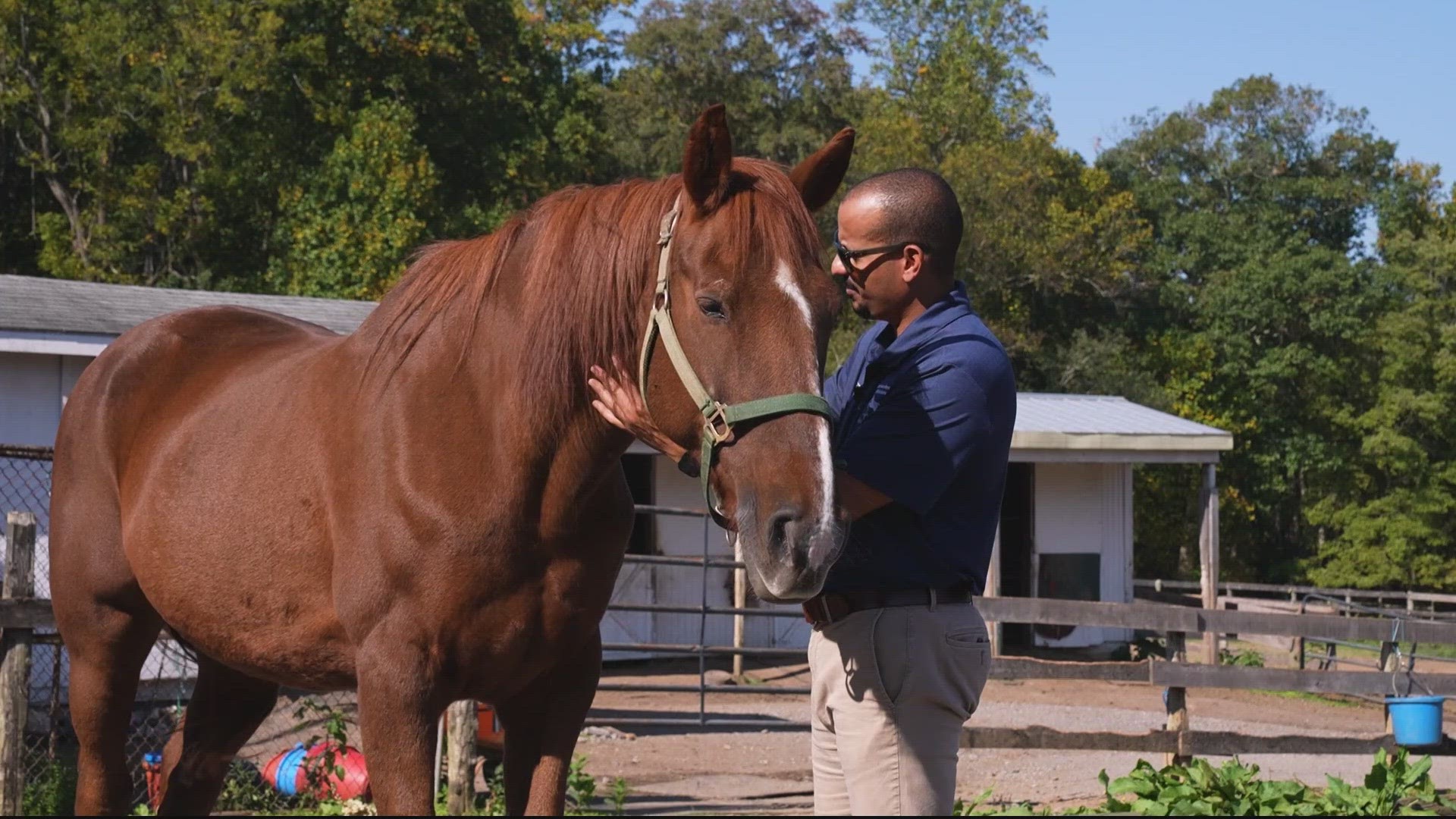GAITHERSBURG, Md. — A local horse rescue in Gaithersburg isn’t just rescuing horses, but military veterans and service members, too.
“I'm an immigrant from the Dominican Republic, and my parents were 10 years old when the Marine Corps went into the Dominican Republic to stop a coup,” said Juan Valdez, a Marine Corps veteran. “When I was deployed, I always thought to myself, ‘How would I want one of those Marines to treat my parents?’ and so I treated the locals like that.”
During his time in the Marine Corps, Valdez deployed four times: once to Jordan, to Iraq twice and once more to Afghanistan. During his first deployment, he was in a rocket attack and on his next deployment to Iraq, he was shot in the chest. After surviving those injuries, Valdez would deploy two more times before he said he couldn’t hide the pain anymore.
When the Marine Corps medically retired him in 2013, he was just 26 days shy of 10 years of service.
“It was a big adventure,” said Valdez. “It was intense. Was it dangerous? Absolutely. And was I scared? Absolutely. But it was a lot of fun.”
Returning to the U.S., Valdez said the transition back to civilian life wasn’t easy.
“When you're in the Marine Corps, people were there to tell you where to go, what to do, when to be there,” he said. “When you get out, you don't have that. It's not just a job, it's not just a career, it's a way of life, it's everything for you. And when you get out, you're lost.”
What Valdez says stands in the way of many veterans and seeking out help with the difficult transition? Pride.
“We want to figure things out on our own, even though we don't know what we're doing,” said Valdez. “A lot of times, it's so that we have to hit rock bottom in order for us to change.”
That “rock bottom” moment for him came nine years after getting out of the Marines.
“I was in a very dark place,” he said. “Things weren't going well at work; it was just a very stressful and unhealthy environment at the time, going through a divorce.”
Gaithersburg horse rescue helping animals – and veterans too
In May 2022, Valdez began participating in the Lifeline Equine Therapy Services (LETS) program at Lifeline Horse Rescue and Rehabilitation, a horse rescue in Gaithersburg, Maryland, that doubles as an equine-assisted therapy program for service members and veterans.
“I've always loved animals. I just have this connection with them,” he said. “They help put me at ease.”
Leila Hertzberg, the executive director and equine specialist for LETS, has been rescuing horses for over 30 years. She started the nonprofit organization Lifeline Horse Rescue and Rehabilitation in 2017 to rescue more horses than she was able to on her own.
“As a major part of the rescue, I wanted to have a way to help people as well,” Hertzberg added. “So that's when we came up with the idea of Lifeline Equine Therapy Services or the LETS program, which provides services to veterans and service members without charge who need help.”
Hertzberg, whose son serves in the Maryland Army National Guard, chose an unmounted model of equine therapy known as Eagala for the program, which involves the client, the horses, an equine specialist and a licensed mental health provider.
“I like to talk about this approach as being talk-less therapy, as opposed to conventional talk therapies,” said Jesse Logan, the mental health specialist and clinical director of LETS.
Logan added that Eagala therapy is based on metaphor.
“The whole set setting is open … and the idea is for people to begin to take their story from all being internal to being external and be able to walk around it and talk about it and ask questions about it,” he said.
The rescued horses used in the LETS program provide a unique aspect to the healing journeys of its clients.
“Rescued horses and veterans have a lot in common,” said Hertzberg. “Both in many cases have experienced trauma.”
Valdez said he was able to connect with these horses for that reason.
“I felt like I was being rescued as well,” he said. “I felt like I had that in common with them.”
Despite having limited experience with horses prior to LETS, Valdez said the interactions with the animals allowed him to pause and work through his emotions in the moment.
“There's all these emotions of fear, feeling overwhelmed, because horses…it's a huge animal that can potentially kill you,” he said. “I had to pause and talk myself through it. You're here to build that relationship with them, and so I focused on that versus on the negative emotions.”
Logan emphasized the importance of the connection between horses and veterans, adding, “For them to learn how to manage their reactivity to being around horses, it's just a great opportunity.”
For Valdez, the program also taught him how to apply some things he learned in the Marine Corps to his everyday life.
“This program helped give me the pause that I needed to think back to my happiest times,” he said. “I realized, it's when I was volunteering, and I was giving back. I have a very servant heart.”
Since his participation in the LETS program, Valdez began working for the Wounded Warrior Project as a grassroots and constituent affairs coordinator.
“Having organizations like, LETS – It's important because they're looking out for you,” said Valdez. “It takes a lot of guts when you're not in the habit of asking for help to ask for help. It is a big struggle, and it is still a struggle. But at least I'm in a position today where I can catch myself. I don't need to struggle through this on my own; I have teammates here that can help me get through this.”













